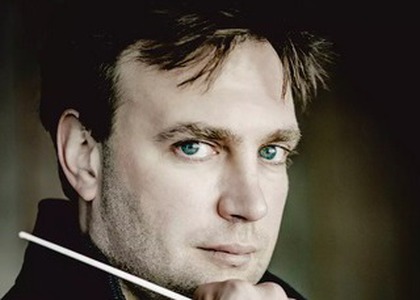> Interviews

Interview with conductor Karel Deseure
Belgian conductor Karel Deseure will conduct the National Radio Orchestra on Friday, the 7th of June 2024, in a concert featuring pianist Eva Garet. The musician shares insights about the upcoming program and his collaboration with the ensemble members in an interview with our colleague, Sarah Natsis:
Mr. Karel Deseure, Friday's concert marks your first collaboration with the National Radio Orchestra. What are the main challenges you face when working with a new musical ensemble, and how do you manage them?
When you work with an orchestra for the first time, you learn to understand the people and the environment. You're not part of their family, so you need to observe how the ensemble functions, how the members collaborate, how receptive they are, and also how the acoustics of the hall are-and in our case, the hall is excellent.
As a conductor, you have to adapt to all these factors, and that takes time.
On the first day, I usually try to go through the pieces entirely to get accustomed and create a connection, not just between myself and the orchestra, but also between the orchestra and me.
What was your first impression after the rehearsal with the Radio ensemble, and how are the preparations for the concert going?
I think things are going very well. We have worked a lot and very intensely.
The orchestra is extraordinary; the musicians are responsive, they work with great dedication, and together they produce a very beautiful sound, which makes me very happy.
What would you like to share with the audience about the musical program you will present on Friday?
The program is wonderful! It's like a treat, a delight. Both are quintessential Russian works.
It is true that we live in very tense times considering the situation in Russia and Ukraine, but these works were composed long ago, and we should continue to enjoy the beautiful texts and the immense emotions they convey. Both pieces are extremely beautiful and truly first-class works from the great romantic repertoire.
The soloistwill be pianist Eva Garet. How is your collaboration with the artist?
I am very impressed by her - she is so young, only 18 years old, and I'm still trying to understand how it is possible to play at such a high level at this age.
It's not just about playing technically correct; she also has a very interesting musical expression. She truly tells a story, she is very pure and very sincere in what she does, and I am genuinely delighted to work with her, as I am convinced she will become one of the great figures in the piano world of the future.
Before concluding our interview, what advice would you offer a young musician who wants to build a career in conducting?
This is a very interesting subject because I teach conducting at the Amsterdam Conservatory.
First of all, I would mention that if you genuinely feel the desire to be in front of an orchestra, you should direct your entire life in that direction - it is a profession that demands a lot. You need to learn to communicate through your arms, which is very important, and you must master the repertoire, which requires constant study. Furthermore, I encourage attending rehearsals of other conductors. Not just the good ones, but also the less good, because there is much to learn there as well.
Conducting is a profession that requires a lot of experience - you mature with age. You can be very talented and know a lot, but ultimately, experience will make a difference. So, give yourself enough time for that.
Translated by Marian-Cătălin Niculăescu,
University of Bucharest, Faculty of Foreign Languages and Literatures, MTTLC, year I
Corrected by Silvia Petrescu














